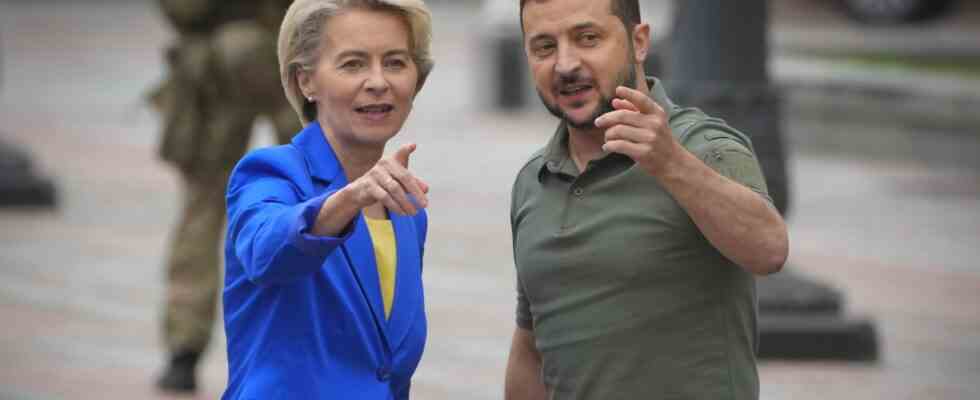background
Status: 11/29/2022 12:40 p.m
In the last study before the Russian attack, experts included Ukraine among the most corrupt countries in Europe. Since the beginning of the war, Kyiv has received billions from the EU – in exchange for a guarantee that reforms will be undertaken.
The European Union wants to help the war-torn Ukrainian population quickly and unbureaucratically. After the Russian invasion began in late February, the community significantly increased its aid and announced more. In doing so, the EU must ensure that its taxpayers’ money does not disappear into dark channels.
During a visit to Kyiv in June, Commission chief Ursula von der Leyen acknowledged progress – and demanded more from President Volodymyr Zelenskyj: “You have done a lot to strengthen the rule of law, but further reforms must be implemented, for example to fight corruption or to modernize the well-functioning administration in order to attract investors.”
The administration is in place, the reform program that Ukraine has undergone in recent years is bearing fruit – results are needed now.
Commissioner: Funds are subject to requirements
According to Deputy Commission President Valdis Dombrovskis, the EU has paid Ukraine a total of 19.7 billion euros since the beginning of the war, not counting military aid. The so-called macro-financial aid of up to nine billion euros is intended to help Kyiv avert state bankruptcy and cover running costs, such as paying wages and pensions and keeping transport connections running. These macro-financial assistance are essentially loans on very favorable terms, which, however, have to be repaid in principle.
For the coming year, the EU is promising a loan package of up to 18 billion euros. According to the Commission, the money will only flow if Kyiv meets certain requirements. They are laid down in an agreement (Memorandum of Understanding) from May: The Ukrainian government must demonstrate satisfactory progress, for example when it comes to selecting candidates for supervisory boards of state banks, fighting nepotism in the judiciary or strengthening the anti-corruption public prosecutor’s office.
At the beginning of November, Vice-Commissioner Dombrovskis presented the aid program for 2023 and emphasized: “Our support will be linked to sectoral and institutional reforms, particularly those relating to the fight against fraud and corruption and strengthening the rule of law.”
Vice-Commissioner Valdis Dombrovskis: Support is also linked to the fight against fraud and corruption.
Image: EPA
Brussels reviews spending and control mechanisms
According to the Commission, it is closely examining the financial structures in the country. She wants “appropriate guarantees for the functioning of the administrative procedures and financial circuits” before disbursing EU funds.
Specifically, Brussels says it checks what Kyiv spends money on and how it monitors the allocation of funds. “The Ukrainian authorities have undertaken to remedy all identified deficiencies appropriately and quickly,” emphasizes a Commission spokeswoman. Kyiv must also report in detail on the use of the billions promised for 2023.
Praise for the EU concept from civil society
Ukrainian civil society has praised the EU approach of linking the allocation of funds to the progress of reforms. Olena Haluska of the Anti-Corruption Action Centre, an anti-corruption NGO, explains: “Since 2014, all macro-financial assistance received by Ukraine has been conditional on the implementation of very clear anti-corruption targets. This has contributed to the establishment of new anti-corruption agencies to fight corruption in high positions and prosecute them.”
Therefore, she is convinced that the same model of conditionality for the new macro-financial assistance program would definitely strengthen the anti-corruption conditions and ensure that all funds are properly used.
Before the war: Harsh expert judgment on Ukraine
In the event of irregularities, the competent EU institutions could theoretically intervene – for example, the European Anti-Fraud Office (OLAF) may conduct investigations in Ukraine. The European Public Prosecutor’s Office (EPPO) could also gather evidence in Ukraine on the basis of international agreements. In March, EPPO and the Ukrainian Prosecutor General’s Office signed a cooperation agreement. However, OLAF and EPPO do not take preventive action, but only when they become aware of irregularities.
Before the war, the verdict of experts on the state of the fight against corruption in Ukraine was devastating. The country is ranked 122nd out of 180 in the Transparency International index. Only in one country on the European continent does it look worse – in Russia. The ranking shows how corrupt a country’s public sector is in the eyes of experts and business people.
“Pandora Papers”: Revelations also hit Selenskyj
According to a report by the European Court of Auditors (ECA), corruption and the government being taken over by private interests are widespread in Ukraine. The EU has not developed a real strategy for this, it should have intervened more severely, according to the special report from September 2021, which, according to an ECA spokesman, no longer reflects the current status.
Also in 2021, the “Pandora Papers” revealed that Zelenskyj used shell companies to conceal assets and maintained contacts with an oligarch accused of fraud billions.

